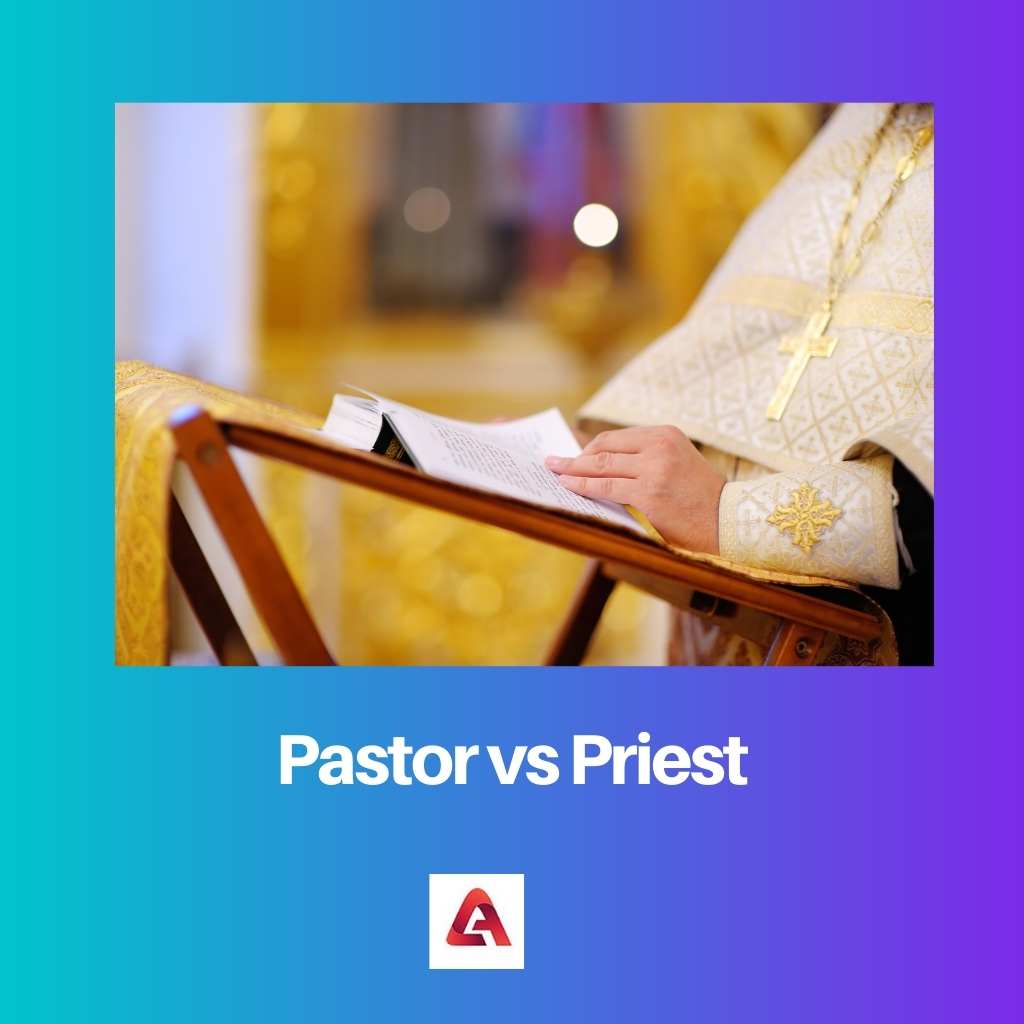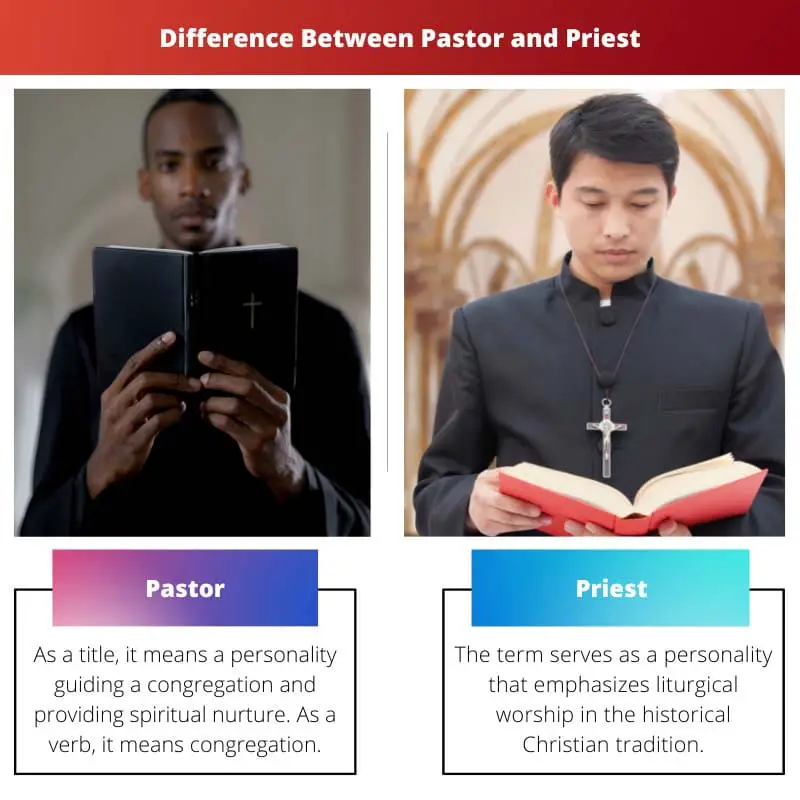If anyone is studying the Christian Ministry, then they might bump into the terms pastor and priest.
Most people use both terms as a replacement for each other, but both are very different in many aspects.
Here is the explanation of aspects that make them different from each other.
Key Takeaways
- Pastors lead Protestant churches, while priests serve in Catholic, Orthodox, and Anglican denominations.
- Pastors can marry and have families, while Catholic priests vow celibacy.
- Priests perform sacraments like baptism and Eucharist, whereas pastors focus on preaching, teaching, and providing spiritual guidance.
Pastor vs Priest
A Christian leader who can counsel people is called a pastor. He also gives advice to the people. He is a leader who gives spiritual teaching. There is no rule for wearing any particular costume for a pastor. A person who knows how to perform sacred rituals is called a priest. There are strict costume standards for a priest.

A leader of the Christain congregation who advises and counsels people is known as a pastor.
They are compulsorily ordained in Lutheranism, Catholicism, Eastern Orthodoxy, Oriental Orthodoxy and Anglicanism.
But in Methodism, they can be licensed or ordained. It serves as a leader or shepherd, taking care of the spiritual needs and teachings of the flock.
A religious leader or person with the qualification to perform sacred rituals of religion and serve as a medium between humans and god is called a priest.
The priesthood position holds the power to administer and advise in religious rites.
A priest must hear confessions periodically, provide marriage and prenuptial counselling, teach catechism, etc.
Comparison Table
| Parameters of Comparison | Pastor | Priest |
|---|---|---|
| Origin | “Pastor” is derived from Latin meaning shepherd and the verb “pasture”. | It originated from the Greek word “presbyteros” and Latin word “presbyter” |
| Meaning | As a title, it means a personality guiding a congregation and providing spiritual nurture. As a verb, it means congregation. | The term serves as a personality that emphasizes liturgical worship in the historical Christian tradition. |
| Training and Education | A protestant or non-denominational church | Starts in the family with deep prayer and devotional life. It is a years-long process. |
| Attire | Not forced to follow a particular set of rules for what costume should be? But sometimes they need to wear a robe with church symbols. | Have to follow strict standards of costume. In Catholic tradition, they wear symbolic layers of amice, alb, cincture, stole and chasuble. |
| Associated professional organizations | National Association for Cristian Ministers, and American Pastors Network | Association of Catholic Priest, and Association of US Catholic Priests |
What is Pastor?
The pastor is the leader of the Christian congregation and serves as the shepherd that guides and provides spiritual advice to the members of the flock.
The title can be ordained in Lutheranism, Catholicism, Eastern Orthodoxy, Oriental Orthodoxy and Anglicanism or be ordained or licensed in Methodism.
The pastor must have achieved spiritual qualifications. Also, the word “Bishops” and “presbyter” are used as interchangeable to the pastor.
In some protestants, elders, bishops or pastors, these words refer to the same title and service in the church.
The word originated from the Latin word “pastor”, meaning shepherd, and derived from its verb “pascere”, literally meaning ‘to lead to a pastor, or cause to eat or set to gazing’.
Elder, shepherd and pastorate are all the same positions with different names.
Many protestants call church ministers “pastors”.
Also, the senior pastor is a title not used to exist in scripture but is used to denote the pastor who does the preaching to avoid confusion in big, multi-staffed churches.

What is Priest?
A priest is a Christian leader that is qualified to perform sacred rituals of religion, acts as a connecting link between god and humans and has the authority to advise and administer spiritual rites.
The term priesthood can be applied collectively to such persons in positions or their offices.
They must be required to hear confessions from people regularly, give spiritual advice, provide marriage and prenuptial counselling, visit hospitals and nursing homes, etc.
A typical definition of the priest does not exist between faiths but includes mediating the relationship between worshipers and deities and administrating religious rituals and rites.
A priest is normally regarded as a human with close contact with gods and deities.
In many religions, priests such as Judaism, Christianity, Buddhism, Shinto, and Hinduism exist to perform these duties.
In many of these religions, priests are not allowed to have any other career options to achieve side by side with the priesthood. Making it a full-time position.

Main Differences Between Pastor and Priest
- A “Pastor” is derived from Latin, meaning shepherd and the verb “pascere”., while priest originates from the Greek word “presbyteros” and the Latin word “presbyter”.
- A pastor as a title, a pastor, means a personality guiding a congregation and providing spiritual nurture. As a verb, it means congregation, while the priest is the term that serves for a personality that emphasizes liturgical worship in the historic Christian tradition.
- A pastor is trained and educated in a protestant or non-denominational church, while a priest’s training and education normally start in the family with deep prayer and devotional life. It is a years-long process.
- A pastor is not forced to follow a particular set of rules for what costume should be. But sometimes, they need to wear a robe with church symbols. In contrast, priests have to follow strict standards of costume. In Catholic tradition, they wear symbolic layers of amice, alb, cincture, stole and chasuble.
- Associated professional organizations for pastors include National Association for Christian Ministers, and American Pastors Network, while the priest is associated with the Association of Catholic Priests and the Association of US Catholic Priests.

- https://onlinelibrary.wiley.com/doi/abs/10.1046/j.1468-5906.2003.00205.x?casa_token=EsYzr5VFi8QAAAAA:wIsVNDem5T7J55nwPf6NUbzodlX5j01ouOUFioAKyMs8ars2qWTEiJ5WnlINDjT-gAEW-VbtvFL8-hraWA
- https://www.cambridge.org/core/journals/central-european-history/article/priest-preacher-pastor-research-on-clerical-office-in-early-modern-europe/3AA797A09E658CB0F7F3ECABDC3BCC47
